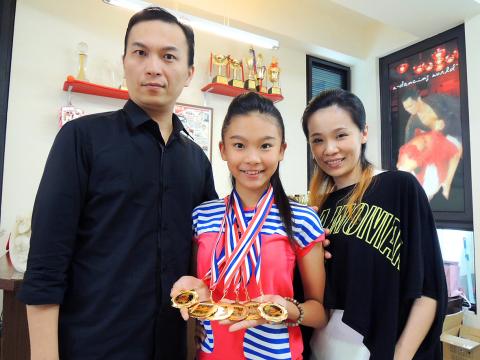China’s rise has attracted an increasing number of Taiwanese entertainers and businesspeople to the world’s second-largest economy, and while some are willing to gain fame and fortune at the expense of their national identity, an 11-year-old professional ballroom dancer and her father say nothing is worth such sacrifice.
Cheng Yu-hsin (鄭玉歆) has been dubbed the “little ballroom dancing diva” after she staged a duo performance with her father, Cheng Chu-hung (鄭竹宏), also a professional ballroom dancer, on a Taiwanese talent show and bagged the championship.
Cheng Yu-hsin started learning ballroom dancing at the age of six and won her first medal at age eight.

Photo: Wang Jung-hsiang, Taipei Times
Over the course of the past three years, the 11-year-old has added more than 200 medals to her list of accolades, including six gold medals at this year’s World Chinese Cup International Standard Dance Transnational Invitational.
However, the Chengs faced a crossroad in December last year when they were invited to perform in a Chinese talent show, China’s Got Talent (中國達人秀), in Shanghai.
“Everything had gone smoothly until a few minutes before my husband and daughter were supposed to go on stage,” Cheng Chu-hung’s wife, Huang Tzu-ling (黃子玲), said earlier this week.
“The show’s director and some staff suddenly asked them to say in the preview to their performance that they came from ‘China, Kaohsiung’ (中國高雄), otherwise the part featuring them could be edited out,” Huang said.
Huang added that the director also tried to persuade them by saying repeatedly that they stood a good chance of getting the judges’ approval and that they could even earn the opportunity to launch a performance tour.
Although making an appearance on the show would have guaranteed them a shot at fame, the father and daughter decided to follow their hearts and tell the live audience that “we come from Taiwan Kaohsiung,” Huang said.
Huang said the statement apparently displeased the program’s director and staff members, as of the four judges on the talent show — including Taiwanese singer Annie Yi (伊能靜), Hong Kong superstar Leon Lai (黎明) and two Chinese entertainers — only Yi gave the Chengs her approval, while one of them even blatantly told the pair that “he simply doesn’t want to give them his approval.”
“The incident involving Aboriginal Taiwanese singer Yeh Wei-ting’s (葉瑋庭) made me realize the predicaments faced by most Taiwanese entertainers wanting to make a name for themselves in China, but I’m glad I chose to stick to my beliefs,” Cheng Chu-hung said.
Cheng Chu-hung was referring to the controversial statement Yeh made last month on the Chinese talent show The Voice of China (中國好聲音), in which she said she came from “China Taipei Pingtung District” (中國台北屏東區).

Chinese Nationalist Party (KMT) Chairman Eric Chu (朱立倫), spokeswoman Yang Chih-yu (楊智伃) and Legislator Hsieh Lung-chieh (謝龍介) would be summoned by police for questioning for leading an illegal assembly on Thursday evening last week, Minister of the Interior Liu Shyh-fang (劉世芳) said today. The three KMT officials led an assembly outside the Taipei City Prosecutors’ Office, a restricted area where public assembly is not allowed, protesting the questioning of several KMT staff and searches of KMT headquarters and offices in a recall petition forgery case. Chu, Yang and Hsieh are all suspected of contravening the Assembly and Parade Act (集會遊行法) by holding

PRAISE: Japanese visitor Takashi Kubota said the Taiwanese temple architecture images showcased in the AI Art Gallery were the most impressive displays he saw Taiwan does not have an official pavilion at the World Expo in Osaka, Japan, because of its diplomatic predicament, but the government-backed Tech World pavilion is drawing interest with its unique recreations of works by Taiwanese artists. The pavilion features an artificial intelligence (AI)-based art gallery showcasing works of famous Taiwanese artists from the Japanese colonial period using innovative technologies. Among its main simulated displays are Eastern gouache paintings by Chen Chin (陳進), Lin Yu-shan (林玉山) and Kuo Hsueh-hu (郭雪湖), who were the three young Taiwanese painters selected for the East Asian Painting exhibition in 1927. Gouache is a water-based

Taiwan would welcome the return of Honduras as a diplomatic ally if its next president decides to make such a move, Minister of Foreign Affairs Lin Chia-lung (林佳龍) said yesterday. “Of course, we would welcome Honduras if they want to restore diplomatic ties with Taiwan after their elections,” Lin said at a meeting of the legislature’s Foreign Affairs and National Defense Committee, when asked to comment on statements made by two of the three Honduran presidential candidates during the presidential campaign in the Central American country. Taiwan is paying close attention to the region as a whole in the wake of a

OFF-TARGET: More than 30,000 participants were expected to take part in the Games next month, but only 6,550 foreign and 19,400 Taiwanese athletes have registered Taipei city councilors yesterday blasted the organizers of next month’s World Masters Games over sudden timetable and venue changes, which they said have caused thousands of participants to back out of the international sporting event, among other organizational issues. They also cited visa delays and political interference by China as reasons many foreign athletes are requesting refunds for the event, to be held from May 17 to 30. Jointly organized by the Taipei and New Taipei City governments, the games have been rocked by numerous controversies since preparations began in 2020. Taipei City Councilor Lin Yen-feng (林延鳳) said yesterday that new measures by